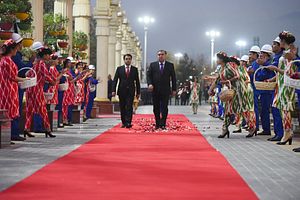Tajikistan’s President Emomali Rahmon is officially running for office, again, ending speculation that he would step aside in favor of letting his son, Rustam Emomali, run for the top spot. Over his more than 28 years in power, Rahmon has carefully arranged the Tajik political arena to his benefit.
Rahmon, 67, is among the longest serving world leaders. He’s led Tajikistan since November 1992. The 2020 presidential election, set for October 11, will mark Rahmon’s fifth election with the only serious question now being the margin by which he wins. In each election, Rahmon has come out on top — 1994 (59.5 percent), 1999 (97.6 percent), 2006 (79.3 percent), 2013 (83.92 percent) — while over the years the opposition has been increasingly squeezed out of the political arena.
In 2015, the crackdown on the Islamic Renaissance Party of Tajikistan (IRPT) cleared the last significant opposition from the country. There exist several political parties in Tajikistan, but none command much influence and many analysts dismiss them as mere democratic window dressing. The Social Democratic Party is arguably the last oppositional party in the country, but its leader, Rakhmatillo Zoirov, says he will boycott the election.
No Tajik election has been judged free and fair by Western observers, though regional observation missions — such as from the Russia-led Commonwealth of Independent States (CIS) have approved of Tajikistan’s polls. After the 2013 presidential election, the Organization for Security and Cooperation in Europe (OSCE) concluded in its final report that while the polls went off peacefully, the election lacked “genuine choice and meaningful pluralism.” Meanwhile, “[e]xtensive positive state-media coverage of the official activities of the incumbent President provided him with a significant advantage.”
Leading up to 2020, there was widespread speculation that Rahmon was considering stepping aside. That speculation was based, in part, on constitutional changes made in 2016 which lowered the threshold to run from 35 to 30. Rustam Emomali is 32. Meanwhile, Emomali was given increasing prominence in state affairs. In 2017 he was made mayor of Dushanbe and in April 2020 he became chair of the Tajik Senate, officially placing him second in line to the presidency.
The same package of constitutional changes in 2016 which opened the possibility of Emomali running, also eliminated term limits for Rahmon. Rahmon had earlier skirted the pesky issue of a two-term limit when the state changed the length of presidential terms from five to seven years in 2003, making 2006 his first seven-year term and 2013 his second. (Uzbekistan’s late President Islam Karimov did something similar.)
In essence, Rahmon set up as many options as possible to ensure that he and his family remain in power. The unpredictable stressors of the moment — a pandemic and a looming economic collapse — likely weighed heavily in favor of Rahmon staying the course rather than toss the reins to Emomali just yet.
The Tajik president has invariably watched the recent succession processes play out in Uzbekistan and Kazakhstan, not to mention always keeping in mind Kyrgyzstan’s two revolutions in less than decade.
Kazakhstan is particularly illustrative. In March 2019, after 29 years as president, Kazakhstan’s Nursultan Nazarbayev surprised the world by resigning. There had been talk in 2018 — from none other than then-head of the Kazakh Senate Kassym-Jomart Tokayev — that Nazarbayev wasn’t going to run in the country’s next election but he walked that comment back. Tokayev is now president — he was right, Nazarbayev did not run in the country’s next presidential election — but Nazarbayev didn’t go very far from power. In mid-2010 a law passed in Kazakhstan gave Nazarbayev the title of “Leader of the Nation,” which came with immunity in perpetuity to judicial prosecution for Nazarbayev and his family and a lifetime role as chair of the security council. Kazakhstan, I wrote in October 2019, remains Nazarbayev’s state.
Coincidentally, in 2015 Rahmon was gifted by Tajik lawmakers the title of “The Founder of Peace and National Unity — Leader of the Nation.” Usually shortened to “Leader of the Nation,” in 2017 state media were instructed to always use the full title. It came with similar perks to Nazarbayev’s version.
As it stands now, Rahmon is guaranteed to win re-election in October. Should he decide — at some point during the ensuing seven-year term — that he’s tired of the office or the moment is ripe, he could pull a Nazarbayev and chose to resign. As long as his son Emomali remains chair of the Senate, he’s positioned to, legally, take on the presidency in event of Rahmon’s resignation or death.
































